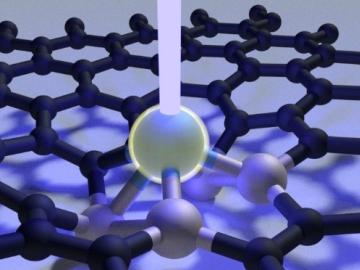
Filter News
Area of Research
- (-) Biological Systems (2)
- (-) Computational Engineering (1)
- (-) Materials (69)
- (-) National Security (16)
- Advanced Manufacturing (5)
- Biology and Environment (72)
- Computational Biology (1)
- Computer Science (6)
- Electricity and Smart Grid (3)
- Energy Science (103)
- Functional Materials for Energy (1)
- Fusion and Fission (24)
- Fusion Energy (15)
- Materials for Computing (12)
- Neutron Science (21)
- Nuclear Science and Technology (14)
- Quantum information Science (3)
- Sensors and Controls (1)
- Supercomputing (54)
News Topics
- (-) Big Data (8)
- (-) Bioenergy (16)
- (-) Composites (9)
- (-) Coronavirus (6)
- (-) Fusion (8)
- (-) Grid (11)
- (-) Microscopy (27)
- (-) Molten Salt (3)
- (-) Polymers (17)
- 3-D Printing/Advanced Manufacturing (25)
- Advanced Reactors (5)
- Artificial Intelligence (22)
- Biology (8)
- Biomedical (10)
- Biotechnology (1)
- Buildings (6)
- Chemical Sciences (32)
- Clean Water (4)
- Computer Science (36)
- Critical Materials (13)
- Cybersecurity (21)
- Energy Storage (35)
- Environment (21)
- Exascale Computing (2)
- Frontier (3)
- High-Performance Computing (9)
- Irradiation (1)
- Isotopes (13)
- ITER (1)
- Machine Learning (17)
- Materials (74)
- Materials Science (78)
- Mathematics (2)
- Nanotechnology (39)
- National Security (35)
- Neutron Science (35)
- Nuclear Energy (21)
- Partnerships (15)
- Physics (28)
- Quantum Computing (3)
- Quantum Science (12)
- Security (11)
- Simulation (2)
- Space Exploration (2)
- Summit (5)
- Transportation (16)
Media Contacts

Real-time measurements captured by researchers at ORNL provide missing insight into chemical separations to recover cobalt, a critical raw material used to make batteries and magnets for modern technologies.

From materials science and earth system modeling to quantum information science and cybersecurity, experts in many fields run simulations and conduct experiments to collect the abundance of data necessary for scientific progress.

Five researchers at the Department of Energy’s Oak Ridge National Laboratory have been named ORNL Corporate Fellows in recognition of significant career accomplishments and continued leadership in their scientific fields.

Oak Ridge National Laboratory researchers have built a novel microscope that provides a “chemical lens” for viewing biological systems including cell membranes and biofilms.

Oak Ridge National Laboratory researchers have developed a thin film, highly conductive solid-state electrolyte made of a polymer and ceramic-based composite for lithium metal batteries.

Oak Ridge National Laboratory’s high-resolution population distribution database, LandScan USA, became permanently available to researchers in time to aid the response to the novel coronavirus pandemic.

In the race to identify solutions to the COVID-19 pandemic, researchers at the Department of Energy’s Oak Ridge National Laboratory are joining the fight by applying expertise in computational science, advanced manufacturing, data science and neutron science.

Scientists at Oak Ridge National Laboratory used a focused beam of electrons to stitch platinum-silicon molecules into graphene, marking the first deliberate insertion of artificial molecules into a graphene host matrix.

OAK RIDGE, Tenn., Feb. 27, 2020 — Researchers at Oak Ridge National Laboratory and the University of Tennessee achieved a rare look at the inner workings of polymer self-assembly at an oil-water interface to advance materials for neuromorphic computing and bio-inspired technologies.

A novel approach developed by scientists at ORNL can scan massive datasets of large-scale satellite images to more accurately map infrastructure – such as buildings and roads – in hours versus days.


